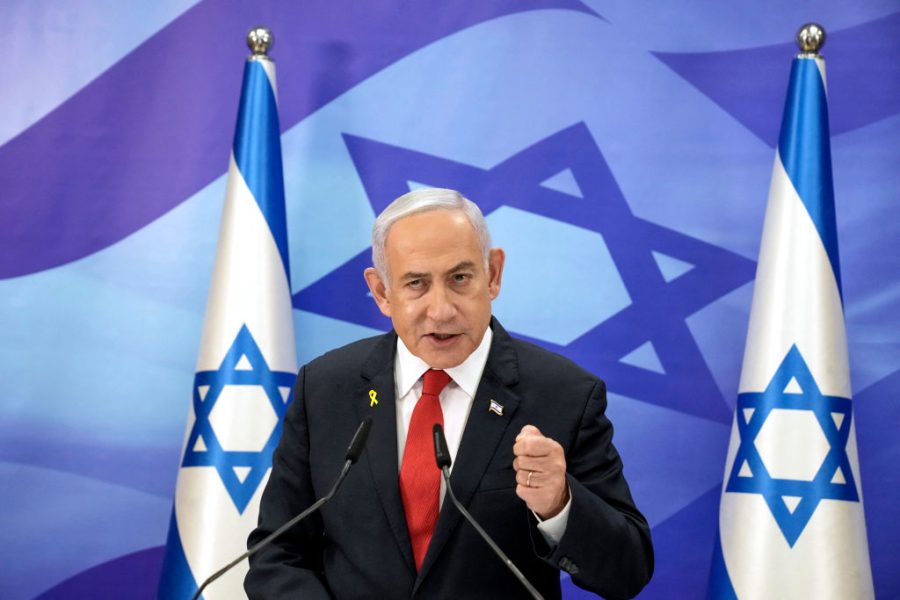Prime Minister Benjamin Netanyahu is once again plunging Israel into a deeply polarising legal and political crisis. Over the weekend, he announced his plan to dismiss Ronen Bar, the chief of Shin Bet, Israel’s domestic security service. This was followed on Tuesday by his decision to renew the war in Gaza, by violating the fragile ceasefire that had stayed in place for several months, showing disregard for the safety of the 59 remaining hostages in the process.
Netanyahu, who is facing three criminal indictments for bribery, fraud, and breach of trust, justified his decision to dismiss Bar by stating that he had lost confidence in his security chief. However, there seems to be another reason behind the Prime Minister’s abrupt decision, one that indicates the severe pressure that Netanyahu is under and is affecting his judgement and decision-making.
The rift in Israeli society is deepening
A few weeks ago, Bar, together with the Israeli police, decided to launch an investigation into two of Netanyahu’s spokespeople and one former strategic advisor on suspicion of dubious ties and financial transactions with Qatar, a country that supports terrorist organisations including Hamas. Their dealings are alleged to have carried on during the war. ‘Qatargate’, as the scandal has been dubbed, has the potential to lead to charges of behavior bordering on treason.
Netanyahu’s decision to fire Bar, whose agency is investigating the Prime Minister’s close circle, seemingly places the Prime Minister in a position of a conflict of interest. And it raises suspicions that the dismissal is intended to obstruct the investigation out of fear that it might implicate Netanyahu as well.
The Prime Minister’s decision is unprecedented. In the past, some heads of Israel’s intelligence services have resigned or offered their resignation over security failures. But never in the 77 years of Israel’s statehood have any of the country’s intelligence chiefs been fired.
Bar, a 60-year-old veteran of Sayeret Matkal – Israel’s commando force modelled on the SAS – emerged from the rank and file of the operations department in Israel’s Security Agency (ISA), otherwise known by its Hebrew acronym as ‘Shin Bet’ or ‘Shabak’. He was appointed in October 2021 by the short-lived government of Naftali Bennet, Netanyahu’s predecessor. Ahead of the country’s next election, due in November 2026, Bennet, who left politics in 2023, is leading the opinion polls over Netanyahu.
Unlike the US and some western democracies, the heads of Israel’s security services – Shin Bet, Mossad and military intelligence – are neither political appointees nor ‘trusted positions’. They are civil servants whose loyalty is to the state and the law. The prevailing Hebrew expression is that they are loyal to the ‘kingdom and not the king’.
A few days after 5,500 Hamas terrorists invaded Israel on 7 October 2023, massacring 1,200 people and kidnapping a further 251, Bar admitted his agency’s failure to provide an early warning. He said that he accepted his culpability and would resign once the war was over and the hostages freed. Most Israelis don’t doubt that, being a man of principles, he had the intention to follow through with this.
However, most Israelis – according to public opinion polls – think that Netanyahu, who since 2019 engaged in a policy of appeasing Hamas by delivering cash to the group via Qatar in order to buy tranquillity, is equally responsible for the 7 October fiasco. They think that he too should step down. But, having a solid majority in parliament and refusing to set up a state inquiry commission headed by a supreme court judge, Netanyahu is refusing and clinging on to power.
Before the war, Netanyahu and his government began an accelerated process of what they called judicial reform, but what their opponents saw as an attempt to change the nature of the regime. Hundreds of thousands of Israelis poured into the streets in protests that lasted for many months, with some even making threats to stop serving in the military reserves. These protests opposed the efforts of Netanyahu and his ministers to appoint a Supreme Court president, and judges to their liking, shut down the public broadcasting corporation, and place loyalists in key government positions.
Hamas’s invasion halted the protests. Hundreds of thousands of reservists were mobilised for the war, which also expanded into Lebanon against Hezbollah.
Against the backdrop of Bar’s dismissal, which is being blocked by legal proceedings expected to reach the Supreme Court, Netanyahu’s government continues, as if in a frenzy, to push forward new and old legislation aimed at enacting regime change. The opposition and protest movement have resumed demonstrations and have taken to the streets for a second day today. The rift in Israeli society is deepening, with hatred on social media intensifying. Increasingly, people are warning that this could lead to a constitutional crisis and even civil war.







Comments